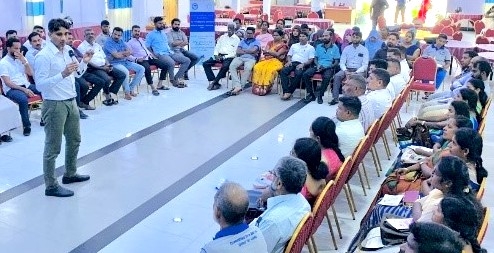To tackle potential religious conflicts during the upcoming local government elections, NPC’s Action for Religious Co-existence (ARC) project organized advocacy campaigns targeting Local Inter Religious Committee (LIRC) members and candidates who are competing in the election. Eight campaigns have been carried out with the participation of 166 LIRC members and 177 election candidates in Trincomalee, Beruwela, Batticaloa, Mawanella, Mannar, Vavuniya, Ampara and Bandarawela.
Through the campaigns, targeted beneficiaries were told how religious conflicts have been known to lead to violence, discrimination and the marginalisation of certain groups, which can have far reaching consequences for individuals and communities. By educating election candidates and LIRC members on the importance of religious tolerance and the dangers of religious conflicts, they are better equipped to promote peace and harmony among different religious groups. This includes developing policies that foster religious diversity, protecting the rights of religious minorities and promoting interfaith dialogue and cooperation.
By emphasising the need to avoid religious conflict, the ARC intervention teaches candidates about the benefits of a pluralistic society and the role that different religions can play in shaping a country's culture and identity.
Participants said politicians should be committed to sustaining peaceful religious coexistence. S.J. Janaka, a candidate for the Trincomalee District, pointed out the need to address the spreading of false rumours that escalate hatred for political advantage. He pointed out the negative consequences of racism that exist in the form of religious divisions.
Mohammad Tuan Kasir, a candidate from the Trincomalee District, highlighted the need for uniting divided communities to achieve reconciliation. "Politicians create conflicts among religious communities. We need to end this negative political culture. Politicians should stop using religion for their political advantage,” he said.
The advocacy programme was a platform for the participants to share their ideas and find solutions through direct questioning. “I want to ask the Muslim people why they still keep the bullet holes in the mosque attacked by the LTTE,” said Wiramuttu Dineshkumar from the Batticaloa District.
Answering him, Moulavi Firdaws Naleemei explained the importance of commemorating people lost in the war. “Commemoration is considered a right in the international world. Everyone has the right to remember and Muslims also have that right,” he said.
“The misuse of religion in politics is a threat to religious freedom and coexistence. These advocacy campaigns are needed to ensure better politics,” said Amila Nishantha from Banadarawela. “This programme created an open platform to discuss our issues directly with the other candidates.
Through discussions we can decide how to mitigate religious based violence. This paves the path for positive change in our society,” M.N.M. Nasrin from Beruwela said.

